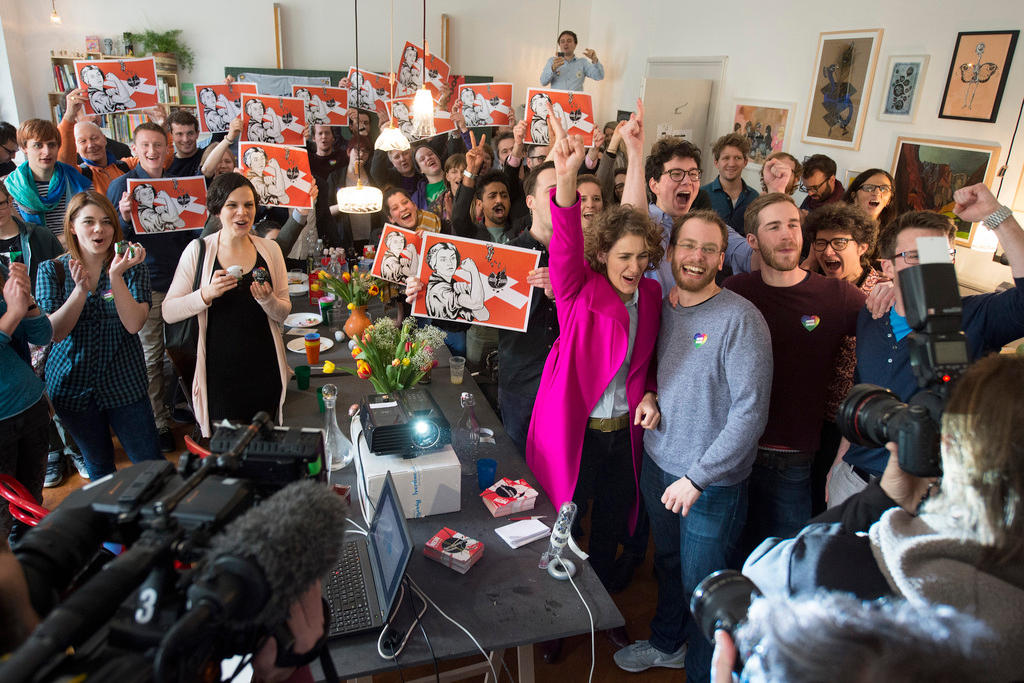Switzerland’s political middle is gaining ground

Switzerland's Liberal Green Party is on a roll. Its rising popularity shows potential for centrist parties in tipping the political balance between the left and the right.
The Worry BarometerExternal link survey shows which institutions the Swiss have confidence in, and which they don’t.
In a 2018 poll, Swiss citizens said they strongly trusted the Federal Court, the police force, the army and the National Bank. Confidence in the government and parliament (the Senate and the House of Representatives) was limited in comparison, although the level of trust remained stable.
Political parties have suffered the biggest losses. At the beginning of the current four-year parliamentary term, more than half of the Swiss voters still had trust in them; this figure has now plummeted to less than 40%. For further details see chart below.
The reason why political parties fare so badly is because they refuse to cooperate! This has been a long-standing issue between the Social Democrats and the Swiss People’s Party, but for a few years now, the Radicals and the Christian Democrats have also been increasingly unwilling to seek compromise solutions.
It took the student protests for climate protection to raise public awareness of the political deadlock apparent in the rejection of tax and pension reforms by voters in 2017 as well as the stalemate over European and climate policies.
Exemplary election victory
The latest political development is often described as a “green wave”, as well as a perceived shift to the left and a push towards more gender equality.
What is less talked about is the fact that the main winners in the elections in canton Zurich in March came from the political centre. But it was not the Christian Democrats, as it may have been expected, struggling to get back to the winning ways for years. Instead, the Liberal Green Party consolidated its strong position, easily increasing its share of the vote by 5.3%.
The magic formula for election victories seems to be the combination of a liberal market economy and sustainable political ideas as stipulated in the Liberal Greens’ programme.
In its 12th year, it managed to further strengthen its position as the fourth-strongest political party. With almost 13% of the vote, they were just behind Zurich’s traditional parties, namely the Swiss People’s Party, the Social Democrats and the Radicals, but still ahead of the Green Party.
Cantonal quirks
The rightwing People’s Party suffered the heaviest losses and, to a certain degree, also the Radical Liberal Party which is busy trying to settle an internal dispute over a proposal to introduce a tax on carbon dioxide.
● The Christian Democrats, the Protestant Party and the Conservative Democratic Party have traditionally occupied the political centre in Zurich’s cantonal parliament. These are small parties that generally follow their very own paths.
● The Liberal Green Party, set up 15 years ago, has become part of the centre and created an innovative network. Following a setback in the 2015 national elections, the party underwent major organisational changes, including the creation of a young chapter. In canton Zurich, the party went even further by combining numerous innovations in the Swiss lobbying and campaigning sector. The Zurich Liberal Greens are closely affiliated with Swisscleantech, an association of innovative renewable energy producers; Science & Cité, a foundation that fosters the dialogue between science and society and offers university courses; and Operation Libero, an organisation fighting against conservative rightwing initiatives.
● The Green Liberal’s political labExternal link was also set up in canton Zurich. It is the first Swiss platform to submit and discuss innovative political ideas.
The Liberal Greens have basically benefitted from the weaknesses of the main parties in the latest elections in canton Zurich. The disruptions triggered by the climate protests has challenged their traditional business model.
If this were the only explanation for the Liberal Greens’ success, they would also have made major gains in other cantonal elections. This, however, was not the case as in Lucerne, Basel Country and Ticino.
The fact that the party did not gain any seats elsewhere makes political commentators doubt that the results of the Zurich elections will be repeated in this autumn’s general elections.
Looking at all cantonal election results and national election polls, a growth of 1.5 percentage points seems plausible for the Liberal Greens.
This translates into three additional seats on top of the existing seven seats in the House of Representatives and would pretty much meet the party’s own expectations.
The Liberal Green Party’s true handicap of not having a representative in the Senate is unlikely to change any time soon as there are no promising candidates with a winning chance. Similarly, the party currently has no representative in any of the 26 cantonal governments.
New dynamics
All this is down to the characteristics of the current Swiss political landscape which political scientists describe as pluralistic and polarised.
Even though the differentiated party system fills all the gaps pretty well, it is just not flexible enough.
The trend over the past 20 years has shown that there is more ideological disagreement between the ever-growing poles on both sides of the political spectrum. At the same time, it has often been difficult to identify a political centre acting as a strong countervailing force.
The Swiss People’s Party and the Radical Party, both on the right of the spectrum, have held the majority in the House of Representatives since 2015. The opposite has been the case in the Senate since the Social and Christian Democrats were given the opportunity to form an alliance.
It is quite possible that all this will change after the October elections. Experts believe that this would actually be an advantage.
According to some political theories a polarised pluralism only works as long as there is a political centre strong enough to govern. We will probably see two variations of this in the next four years.
The Radicals and Christian Democrats will either cooperate again on a regular basis and form alliances in the Senate paving the way for compromises.
Or the polarisation of the House of Representatives will further spread while the Liberal Green Party will play a pivotal role in forming alliances between the two blocks. This could help the left to push through its ideas on climate policy. In turn, the right could benefit from the support to win a majority for its proposals for a reform of the pension system.
Claude Longchamp is a senior political expert and one of Switzerland’s most experienced and highly-regarded political scientists and analysts.
He founded the polling and research institute GfS BernExternal link, which he headed until his retirement. Longchamp has analysed and commented on votes and elections on SRF public Swiss television for 30 years.
Longchamp, a historian and political scientist, also runs the German-language blogs ZoonpoliticonExternal link.
This text is part of #DearDemocracy, a platform on direct democracy issues, by swissinfo.ch. Contributors, including outside authors frequently share their views. The opinions expressed here are not necessarily those of swissinfo.ch.
Adapted from German by Billi Bierling/urs

In compliance with the JTI standards
More: SWI swissinfo.ch certified by the Journalism Trust Initiative












You can find an overview of ongoing debates with our journalists here . Please join us!
If you want to start a conversation about a topic raised in this article or want to report factual errors, email us at english@swissinfo.ch.